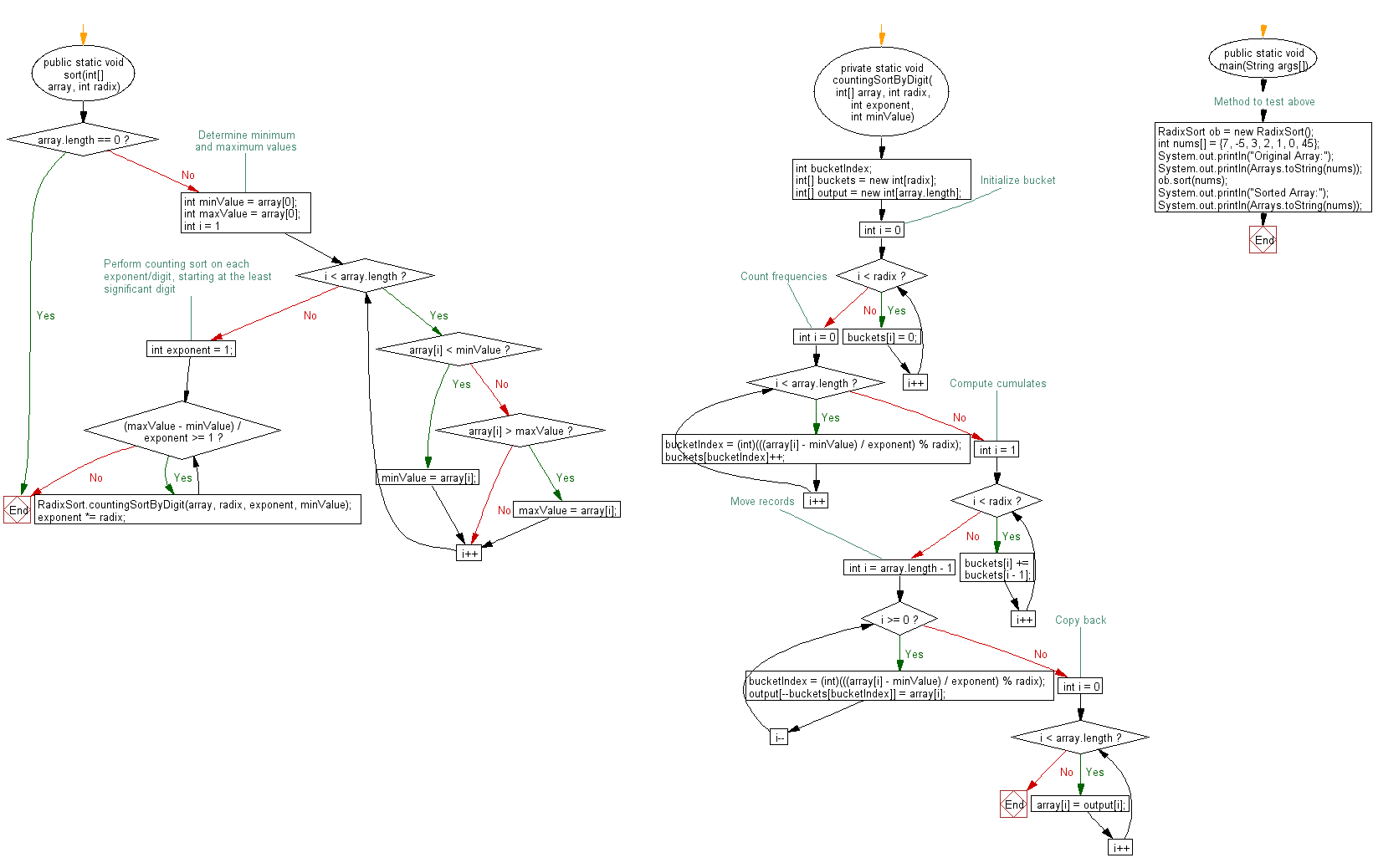Java: Sort an array of given integers using Radix sort Algorithm
3. Radix Sort Implementation
Write a Java program to sort an array of given integers using the Radix sort algorithm.
According to Wikipedia "In computer science, radix sort is a non-comparative integer sorting algorithm that sorts data with integer keys by grouping keys by the individual digits that share the same significant position and value".
Sample Solution:
Java Code:
//https://bit.ly/2MJHo7J
import java.util.Arrays;
public class RadixSort {
public static void sort(int[] array) {
RadixSort.sort(array, 10);
}
public static void sort(int[] array, int radix) {
if (array.length == 0) {
return;
}
// Determine minimum and maximum values
int minValue = array[0];
int maxValue = array[0];
for (int i = 1; i < array.length; i++) {
if (array[i] < minValue) {
minValue = array[i];
} else if (array[i] > maxValue) {
maxValue = array[i];
}
}
// Perform counting sort on each exponent/digit, starting at the least
// significant digit
int exponent = 1;
while ((maxValue - minValue) / exponent >= 1) {
RadixSort.countingSortByDigit(array, radix, exponent, minValue);
exponent *= radix;
}
}
private static void countingSortByDigit(
int[] array, int radix, int exponent, int minValue) {
int bucketIndex;
int[] buckets = new int[radix];
int[] output = new int[array.length];
// Initialize bucket
for (int i = 0; i < radix; i++) {
buckets[i] = 0;
}
// Count frequencies
for (int i = 0; i < array.length; i++) {
bucketIndex = (int)(((array[i] - minValue) / exponent) % radix);
buckets[bucketIndex]++;
}
// Compute cumulates
for (int i = 1; i < radix; i++) {
buckets[i] += buckets[i - 1];
}
// Move records
for (int i = array.length - 1; i >= 0; i--) {
bucketIndex = (int)(((array[i] - minValue) / exponent) % radix);
output[--buckets[bucketIndex]] = array[i];
}
// Copy back
for (int i = 0; i < array.length; i++) {
array[i] = output[i];
}
}
// Method to test above
public static void main(String args[])
{
RadixSort ob = new RadixSort();
int nums[] = {7, -5, 3, 2, 1, 0, 45};
System.out.println("Original Array:");
System.out.println(Arrays.toString(nums));
ob.sort(nums);
System.out.println("Sorted Array:");
System.out.println(Arrays.toString(nums));
}
}
Sample Output:
Original Array: [7, -5, 3, 2, 1, 0, 45] Sorted Array: [-5, 0, 1, 2, 3, 7, 45]
Flowchart:

For more Practice: Solve these Related Problems:
- Write a Java program to implement radix sort for an array of integers including negative numbers.
- Write a Java program to extend radix sort to sort a list of strings by their characters.
- Write a Java program to implement a stable version of radix sort and compare its performance with merge sort.
- Write a Java program to modify radix sort to sort floating-point numbers by first scaling them appropriately.
Go to:
PREV : Bubble Sort Implementation.
NEXT : Merge Sort Implementation.
Java Code Editor:
Contribute your code and comments through Disqus.
What is the difficulty level of this exercise?
Test your Programming skills with w3resource's quiz.
